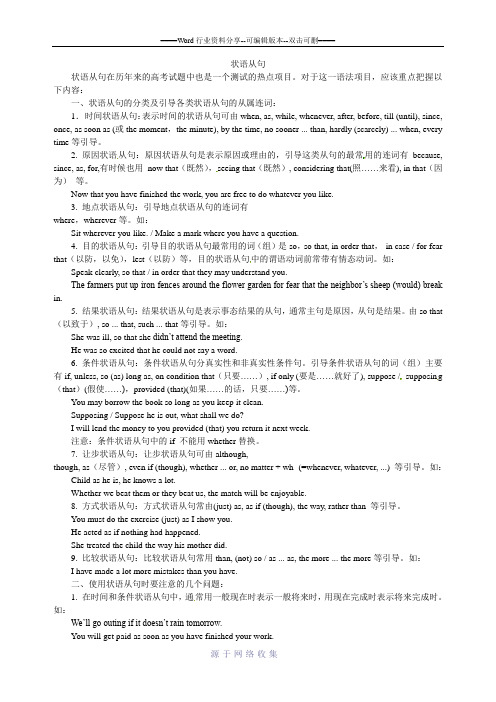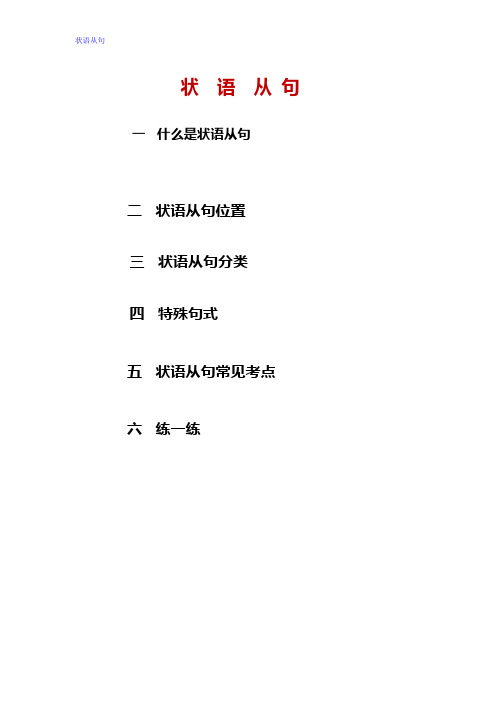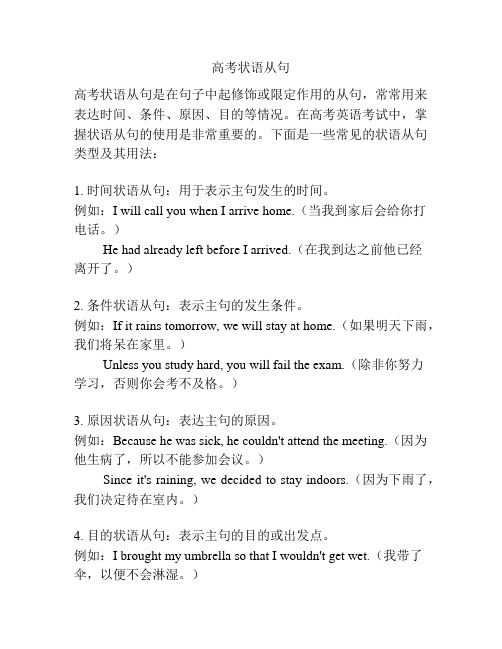高考状语从句讲解
状语从句精讲(使用于高考英语)

状语从句状语从句在历年来的高考试题中也是一个测试的热点项目。
对于这一语法项目,应该重点把握以下内容:一、状语从句的分类及引导各类状语从句的从属连词:1.时间状语从句:表示时间的状语从句可由when, as, while, whenever, after, before, till (until), since, once, as soon as (或the moment,the minute), by the time, no sooner ... than, hardly (scarcely) ... when, every time等引导。
2. 原因状语从句:原因状语从句是表示原因或理由的,引导这类从句的最常用的连词有because, since, as, for,有时候也用now that(既然),seeing that(既然), considering that(照……来看), in that(因为)等。
Now that you have finished the work, you are free to do whatever you like.3. 地点状语从句:引导地点状语从句的连词有where,wherever等。
如:Sit wherever you like. / Make a mark where you have a question.4. 目的状语从句:引导目的状语从句最常用的词(组)是so,so that, in order that,in case / for fear that(以防,以免),lest(以防)等,目的状语从句中的谓语动词前常带有情态动词。
如:Speak clearly, so that / in order that they may understand you.The farmers put up iron fences around the flower garden for fear that the neighbor’s sheep (would) break in.5. 结果状语从句:结果状语从句是表示事态结果的从句,通常主句是原因,从句是结果。
高考英语重要语法知识:状语从句

高考英语重要语法知识:状语从句定义:在句中作状语的从句是状语从句,修饰主句中的动词、形容词或副词等。
状语从句由从属连词引导,从属连词在句中不充当句子成分,只起连接作用,状语从句放在句首时,要用逗号,放在句尾时不用。
分类:根据意义上的不同,状语从句可分为:①时间状语从句②地点状语从句③原因状语从句④目的状语从句⑤条件状语从句⑥结果状语从句⑦让步状语从句⑧方式状语从句⑨比较状语从句一、时间状语从句引导时间状语从句的连词有:as, when(whenever),while, before, after, as soon as, until(till), since,every/each/next time, once.( as, when, while都有“当……的时候”,可以互用)◆When、While、as的区别:①when是at or during the time ,既指时间点,也可指一段时间,因此when引导的时间状语从句中的动词可以是终止性动词,也可以是延续性动词;while是during the time,只指一段时间,所以while从句中的动词必须是延续性动词。
②when说明从句的动作和主句的动作可以是同时,也可以是先后发生;when从句多用一般过去时while主从句动作或状态同时发生。
while从句多用过去进行时eg. When the teacher came in,we_____________________(talk).When the clock struck twelve,all the lights went out.When we arrived at the station,the train had left.While we _____________(have)supper,all the lights went out.While I was writing letters last night,he was watching TV.④when和while还可作并列连词when表示“就在那时”; while表示“然而”,表前后意思的对比。
高考英语 重难点语法讲解-状语从句

状语从句1.引导状语从句的连词时间状语从句when(as、while)(当……时候)、since(自从)、before(在……之前)、after(在……之后)、until(till)(直到……才)、whenever(每当)、once (一旦)、every time(每当)、the day(在……那天)、as soon as(一……就)、hardly(scarcely)……when(一……就)、no sooner……than(一……就)、instantly(immediately、directly)(一……就)、the moment(minute、second、instant)(一……就)地点状语从句where(在……地方)、wherever(在任何地方)、every where(在每个地方)原因状语从句because(as、for)(因为)、since(既然)、when(既然)、now(that)(既然)、in that(因为、既然)条件状语从句if(如果)、unless(除非)、as(so)long as(只要)、providing (provided)(that)(假如)、suppose(supposing)(that)(假如)、in case(如果)、only if(如果)、if only(但愿、如果……就好了)、on condition that(条件是)让步状语从句though(although)(虽然)、even if(even though)(即使)、while(虽然、尽管)、whatever(no matter what)(无论如何)、whenever(no matter when)(无论何时)、wherever(no matter where)(无论哪里)、whoever(no matter who)(无论谁)、however(no matter how)(无论怎样)、for all(that)(尽管)、granting(granted) that(即使)、whether……or(不论……还是)、in spite of (despite)the fact that(不管)结果状语从句so that(so、that)(结果)、so(such)……that(如此……以至于)、but that(but)(要不是)目的状语从句so that(so、that)(为了、以使)、lest(以防)、in case(以防、以免)、for fear that(以防)、in order that(为了)比较状语从句than(比……)、as……as(像……一样)、not so(as)……as (不像……一样)、(not)the same as((不)同……一样)、not so as(不如)、(not)such……as((不)如……)方式状语从句as(像……、犹如……)、as if(as though)(好像、仿佛)、the way(……的样子)2、时间状语从句(表示时间的状语从句)①when、whenever、while和aswhen意为“当……时候”,表示某个具体的时间。
高考英语语法复习:八种状语从句的用法

高考英语语法复习:八种状语从句的用法状语从句状语从句有时间、地点、原因、目的、方式、结果、条件、让步等八种。
一、时间状语从句:引导词有after,before,as,once,since,till,until,when,whenever,while,as soon as,the moment/minute…(一…就),the time,the day,every time,next time,each time,by the time of,no sooner…than(一…就),hardly…when(一…就).例如:Each/Every time he comes here,he will drop in on me.每次他来这儿他都顺便看我.He was ill last time I saw him.上次我见到他时他病了.No sooner had she heard the news than she cried.她一听到这个消息就哭了.[辨析]when与whilewhen引导的从句动词可以是延续性的或短暂性的,while引导的从句中动词必须是延续性的;在“be…when…”句式中when表“at that time(就在这时)”意,这样用的when不能换为while;while有时并不表示时间,而表示对比,意“而”、“却”,when无这样的用法。
例如:When I got home I found the door locked./While(或When)we were working in the fields,it suddenly began to rain./He was wandering through the streets when a bike hit him./His pencil is red,while mine is yellow.[辨析]till与until一般情况下可以互换,但until可以位于句首,till则不能。
高考英语状语从句专项讲解

高考英语状语从句专项讲解一、考点分析状语从句主要考点在语法填空、翻译和作文。
二、专题详解状语从句梳理知识点1:分类语从句可以分为以下九种:1、时间状语从句2、地点状语从句3、原因状语从句4、目的状语从句5、结果状语从句6、条件状语从句7、方式状语从句8、让步状语从句9、比较状语从句知识点2:具体用法1) 时间状语从句:as soon as Hardly/scarcely had…whenNo sooner had …than….the moment.. the instant…the second…immediately directly…instantly…①As soon as I arrive in Shanghai, I’ll writeto you.我一到上海就给你写信。
② Hardly (scarcely) had I got homewhen it began to rain.我刚一到家就下雨了。
③No sooner had we got to the stationthan the train left.我们刚到车站,火车就走了。
④We had just begun the moment wewere told to stop.我们刚开始就被叫停。
⑤I felt cheerful immediately I heard thesong.我一听到这首歌就感到很愉快。
①hardly…when和nosooner…than的意义相当于as soon as,但只表示过去发生的事情,主句为过去完成时,从句为过去时,如hardly或no sooner位于句首时语气强,而且主句的谓语要用部分倒装。
②名词短语连词:“一……就……”主句+ the moment…从句主句+the instant…从句主句+the second…从句③ 副词短语连词:主句+ immediately +从句主句+ directly +从句主句+ instantly+从句every time =each time last time…next time…the first time ①Every time I traveled by boat, I gotseasick.我每次乘船都晕船。
高考状语从句讲解和练习题

⾼考状语从句讲解和练习题定义——在复合句中由从句表⽰的状语称作状语从句,状语从句由从属连词引导,也可以由⼀个起连词作⽤的词组引导,有时甚⾄不需要连词⽽直接和主句连接起来。
类型——时间、地点、原因、结果、条件、⽬的、让步、⽅式、⽐较状语从句。
1.引导词when, while, as, as soon as, once, before, after, every time, each time, since, whenever, ever since, until ,till等。
2.whenever, each time, every time的⽤法。
注:whenever=no matter whenevery time / each time 每次,whenever 每当······时,表⽰习惯性、经常性的动作。
Whenever we met with difficulties, they came to help us.Each time he came to town he would visit our school.Eevery time I went to his house, he was out.注:whenever=no matter whenwhenever既可以引导时间从句也可引导名词性从句,no matter when只可以引导时间状语从句。
It does not matter whenever the party begins.3.before的汉英表达1)before的基本含义是“在·····以前”The train had left before he got to the station.注意:与before对应的是after引导的时间状语从句,表“在·····之后”。
高考英语复习 状语从句讲解

状语从句状语从句一什么是状语从句二状语从句位置三状语从句分类四特殊句式五状语从句常见考点六练一练一什么是状语从句状语从句是行使状语功能的从句,因为其作用相当于副词,它可以用来修饰谓语、定语、状语或整个句子。
状语从句通常由一个连接词或起连接词作用的词组引导。
二状语从句位置比较灵活,有时可以放于句首,有时可以置于句末。
状语从句位于句首时,其后常用逗号与后面的句子隔开。
三状语从句分类让步状语though, although, even though, while whether ,whoever/no matter who ,whatever/ n o m atter w hat ,whenever/ no matterEven t hough y ou s ay s o, I d o n ot believe it.比较状语 than as …as ,the more … the moreThe m ore I s ee him , t he l ess I l ike h im. 方式状语as, as if , as thoughHe t old m e e verything a s i f I w ere h isbest friend.四 特殊句式时间状语中 A:It + b e +时间点+ w hen …… 当某事发生时是什么时候It was 11:00 PM when he came back last night.B:It i s/has b een +时间段 + s ince …… 自从某事发生后已过了多久时间It i s /has b een t wo y ears s ince I e ntered t he t he s enior s chool.C:It + be +时间段 + before …… 在某事发生之前需要多久时间It was 8 years before we finally drove away the Japanese invaders. It m ight b e a l ong t ime b efore C hinese l and o n t he m oon.让步状语从句A: as 引导的让步状语从句, 从句的表语、状语必须前置到句首。
高考状语从句

高考状语从句高考状语从句是在句子中起修饰或限定作用的从句,常常用来表达时间、条件、原因、目的等情况。
在高考英语考试中,掌握状语从句的使用是非常重要的。
下面是一些常见的状语从句类型及其用法:1. 时间状语从句:用于表示主句发生的时间。
例如:I will call you when I arrive home.(当我到家后会给你打电话。
)He had already left before I arrived.(在我到达之前他已经离开了。
)2. 条件状语从句:表示主句的发生条件。
例如:If it rains tomorrow, we will stay at home.(如果明天下雨,我们将呆在家里。
)Unless you study hard, you will fail the exam.(除非你努力学习,否则你会考不及格。
)3. 原因状语从句:表达主句的原因。
例如:Because he was sick, he couldn't attend the meeting.(因为他生病了,所以不能参加会议。
)Since it's raining, we decided to stay indoors.(因为下雨了,我们决定待在室内。
)4. 目的状语从句:表示主句的目的或出发点。
例如:I brought my umbrella so that I wouldn't get wet.(我带了伞,以便不会淋湿。
)He works hard in order that he can achieve his goals.(他努力工作以便能达到自己的目标。
)以上只是状语从句的几个常见用法,考生在备考过程中还需多加练习,加深对状语从句的理解和使用。
- 1、下载文档前请自行甄别文档内容的完整性,平台不提供额外的编辑、内容补充、找答案等附加服务。
- 2、"仅部分预览"的文档,不可在线预览部分如存在完整性等问题,可反馈申请退款(可完整预览的文档不适用该条件!)。
- 3、如文档侵犯您的权益,请联系客服反馈,我们会尽快为您处理(人工客服工作时间:9:00-18:30)。
状语从句时间状语从句:when , whenever , as , while, before , after, until, till, since, ever since, once, as soon as, every time, the moment, instantly, directly地点状语从句:where , wherever原因状语从句:as, because, since, seeing(that) , considering (that) , now that , n ot that…but that 目的状语从句:that , so that , in order that , lest , for fear that , in case结果状语从句:that , so … that , such … that条件状语从句:if , unless , suppose , supposing ,so/as long as, so far as, on condition(that ) ,provided ( that )让步状语从句:though , although , no matter , even if , even though , however , whatever比较状语从句:than , as方式状语从句as, as if, as though一、时间状语从句1、when, while, as 和wheneverwhen 表时间点,时间段while 表时间段;有“而”的意思as “当……”,“一边……一边”,“随着……”whenever 每当,无论什么时候It is cold when it snows.While there is life, there is hope.While we were speaking, he was reading newspaper.Just as Mrs Richards was entering the dinning-room, there was a knock on the front door.As we age, we trade strength for ingenuity, speed for thoroughness, and passion for reason.随着年龄的增长,我们用力量换来了机敏,以速度换来了严谨,以热情换来了理智。
注:1)when还可作并列连词,其意义为“那时,这时”,相当于and at this/that time。
常用于下列句式:sb.was doing sth.when...某人正在干某事就在这时……sb.was about to/ going to do sth.when...某人正打算干某事就在这时……sb.body has just done sth.when...某人刚干了某事就在这时……2)如果主句表示的是短暂动作,而从句用延续性动词的进行时态表示在一段时间内正在进行的动作时,when,while 与as可互换使用。
如:When/While/As I was walking down the street,I came across an old friend of mine.2、before/ afterIt will be five years before we meet again.五年之后我们才能见面。
After you think it over, please let me know what you decide.After her husband had gone to work, she sent her children to school.3、until, till, not...until1)肯定句:主句的谓语是延续性动词,主从句均为肯定式,意为“某动作一直持续到某时间点才停止”Please wait until I come back.等我回来。
2)否定句:主句的谓语是非延续性动作,从句为肯定式,意为“某动作一直到时间点才开始”He won’t go to bed till/until she returns.3)Till不可以用在句首,而until可以Until you told me I had no idea of it.4)not…until句型中的强调和倒装用法It was not until you told me that I had any idea of it.Not until you told me did I have any idea if it.4、since从句谓语动词多用于一般过去时态,主句用现在完成时态或现在完成进行时态She has been working in this factory since she left school.I have written to Alice four times since I came here.It is +一段时间+since从句的句型中,时间计算一律从since从句动作完成或状态结束时算起It is three years since the war broke out. 战争爆发以来,有三年了。
It is three years since she was in our class.她离开我们班有三年了。
5、as soon as, immediately, directly, instantly, the moment/ minute/ instant/ secondno sooner…than…, hardly/scarcely/barely…when…,“一……就”once(一旦)The moment I heard the voice, I know father was coming.Directly I had done it, I knew I hold made a mistake.The instant he saw me, he ran away.I had hardly got home when it began to rain.hardly/no sooner主句用过去完成时,when/than引导的从句用一般过去时,固定结构No sooner had we arrived at the station than the train left.6、by the time到……时候;到……之前(从句用一般过去时,主句用过去完成时)each/every time和the next timeBy the time I got outside, the bus had already left.Each time she came, Jane brought me a nice book.二、地点状语从句where或wherever/ anywhere/ everywhere1.Stay where you are.2.The photo of mine was taken where stood the famous high tower.3.Wherever you go, you can see new factories and stories.4.Everywhere you go, you will find the same thing.5.Where there is a will, there is a way.6.Plants will grow almost anywhere there is plenty of air, water and sunlight.判断:You’d better make a mark where you have questions.You’d better make a mark at the place where you have questions.三、原因状语从句because/as由于/for/since既然/now that/seeing that/considering that…1)because强调原因,是句子较重要的部分,在很多情况下,不能用since,for等替代。
Henry didn’t go to the office bec ause it was raining.He resigned partly because he was old and partly because he was bored with the work.I didn’t help, not because I was unwilling, but because I was unable to do it.2)as和since所提出的原因是已知的,或是句中不重要的部分,since较as稍正式一些As his fat is in a large town, he has no garden of his own.Since you don’t trust him, you should not employ him.3)for,一种补充说明,而且for引导的句子不能放在句首,for是并列连词He seldom goes out now, for he is very old.4)not that…but that...“不是因为……而是因为……”It’s not that I’m dissatisfied, but that I have my ow n business to attend to.5) in that多出现主句之后;seeing that因为,鉴于;considering that因为,考虑到I like this place, but I like my hometown better in that I have more friends there.Seeing that/ since he was there, he may have seen her.That is excusable considering/ seeing (that) he is so young四、条状语从句1)真实条件从句:属性,习惯,推测,对未来的预测If you heat ice, it melts.If he is in London, he is undoubtedly staying at this hotel.If businessmen want to borrow money, they go to see their bank managers.If he breaks his p romise, she’ll never speak to him again.2) 非真实条件句:虚拟语气3)if only引导状语从句,要用虚拟语气,“但愿,要……就好了”If only I had more money, I could buy a car. (对现在情况表示遗憾)If only I had known it, I wouldn’t have troubled him. (对过去情况表示遗憾)only if 只有,用陈述语气You’ll succeed only if you put all your heart into it.4) provided/ providing (that)“在……条件下”,“要是”,“以……为条件”on condition (that)under the condition (that)suppose/ supposing (that)“假定”,主句多是疑问句granted/ granting (that) “假定…….”,“就算是”,有浓厚的让步意义,可意为“姑且”given that…“假设”主要强调以假定的方式提出前提条件。
